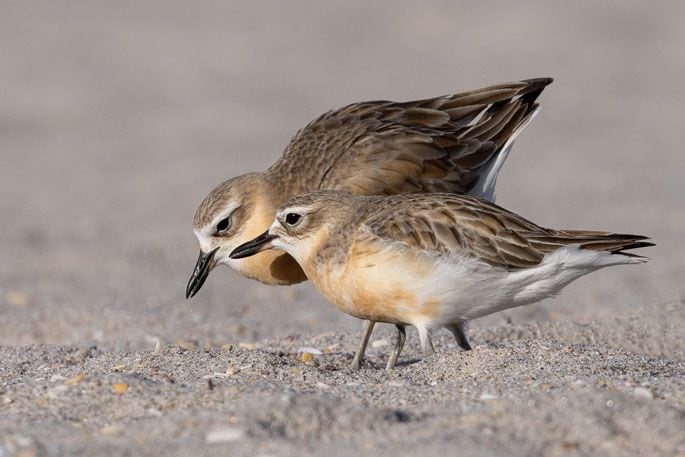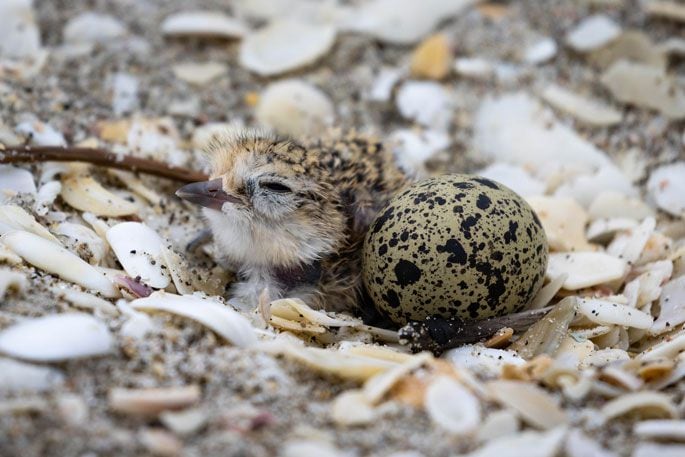Visitors and residents in the Bay of Plenty are being warned to watch where they tread on the beach this summer.
While many people will be here to relax, a handful of volunteers will be on the beaches fencing off and monitoring the dotterels and other shorebirds as they attempt to nest and produce chicks.
New Zealand dotterels are endemic, meaning they do not appear in other countries – they are purely a New Zealand bird, Bay Conservation Alliance shorebird volunteer co-ordinator Stuart Attwood said.
“You will see these charismatic birds racing up and down the beaches, they will quite often come close to us, they aren’t really being friendly, it is an attempt to protect their nests or chicks.”

Stuart Attwood says dotterels a 3-5% survival rate. Supplied photo
The status of dotterels was “at risk”, they had a hard time during breeding, and their chicks and eggs were vulnerable to predation from gulls, hawks and other flying predators, Attwood said.
“On the ground hedgehogs, cats, stoats and dogs along with tides and storm surges add to the risks that face dotterels daily. Life as a breeding dotterel is precarious.”
He said one of the biggest threats to their survival is humans.
“Over the years we have experienced vandalism to nesting sites, chicks being run over by vehicles on beaches and any number of incidents of thoughtless behaviour around nesting sites.
“And sometimes it’s innocent trampling because the eggs and nests are so camouflaged in the sand. Some of the questions that we as dotterel minders are asked is ‘why don’t they nest somewhere else'? or ‘can’t you shift them'?
“Their environment is under threat from development and suitable nesting areas are becoming harder to find.
“The beach is their home and they have a right to be there, as just as sharks have a right to be in the ocean.”

A freshly hatched dotterel. Photo / Supplied
Attwood said dotterels were nesting on the beaches for thousands of years before humans arrived.
He’s grateful volunteers are now out there taking care of them as best as they can but more help is needed,
He said the survival rate of dotterel nests and chicks was low and “we are right on the edge of population sustainability in the region”.
If you are visiting the region there are things you can do to help the volunteers and the birds to ensure we continue to see dotterels on our beaches:
- Keep your dog on a lead. One of the most common comments we hear is “my dog is well behaved” or similar. This may be so, but shorebirds and dogs do not mix. If a dotterel sees a dog it will often get off its nest to protect it. The eggs need to have their temperature regulated and it can take only a few minutes for eggs to die if the bird leaves the eggs exposed, especially in the heat of summer or if they get too cold. Dogs also take birds, well behaved or not, it is instinctive in them.
- Take note of where and when dog walking is allowed. There are plenty of signs around the beaches and the information is also available at:
https://www.westernbay.govt.nz/council/news-and-updates/news?item=id:2ki387nhd1cxbypcqdga
- The birds are easily observed, take time and watch them. They really are characters. Please give them space to feed at the water line and watch out for chicks because they are mall and easily trodden on.
- They don’t’ necessarily nest on the beach, sometimes they appear on reserves. If you come across a fenced-off area, please be respectful of the birds. Often it seems the fenced areas are quite large, this is to give the birds space to observe their surroundings. Unlike other bird species that hide away, dotterels like a nice 365-degree view of their surroundings, this is a survival behaviour. Footprints in the sand leading up to dotterel nests also act like giant arrows to flying predators. Walking up to a nest can lead other birds to vulnerable eggs.
- Take note of nesting bird signs, letting us know where birds are.
- Let your children know about the birds. We often see kid-sized footprints inside nesting areas and curiosity can often lead to nests being disturbed and eggs removed.
- Please respect our volunteers, they will usually introduce themselves and are happy to chat about the dotterels. Do not take offence if you are asked to put your dog on its lead or are asked not to attempt to feed the birds (dotterels don’t eat chips or bread). Remember that these folk are giving up their own time to look after the birds.
- If you find a nest, let us know. The easiest way to do this is to call the DoC hotline 0800 362 468, you can use this number to alert us to nests and any illegal activity that concerns our wildlife. It may take some time to get through, the Department of Conservation is busy at this time of year. The messages do get back to us, so we can get into action and fence off new nests.



0 comments
Leave a Comment
You must be logged in to make a comment.